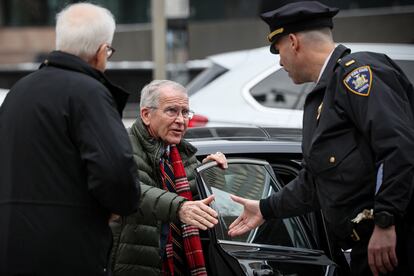Oliver North says NRA reacted to misconduct allegations like a ‘circular firing squad’
North said he was pushed out as president of the NRA after seeking an independent review of some unusual expenses, including an ‘astronomical’ sum spent on lawyers by the longtime chief executive, Wayne LaPierre

Oliver North testified Tuesday that he was forced out of the National Rifle Association after raising allegations of financial irregularities within the powerful lobbying organization, likening the group’s reaction to that of a “circular firing squad.”
North, 80, said he was pushed out as president of the NRA after seeking an independent review of some unusual expenses, including an “astronomical” sum that he said was spent on lawyers by the longtime chief executive, Wayne LaPierre.
LaPierre remarked that the lawyers are “the only reason I’m not going to spend the rest of my life in an orange jumpsuit,” North told jurors in a Manhattan courtroom.
Best known for his central role in the Iran-Contra scandal of the 1980s, North served as president of the NRA for less than a year before resigning in 2019 amid a bitter dispute with LaPierre, his one-time friend.
He was called to testify in the third week of the civil corruption trial focused on whether LaPierre treated himself to millions of dollars in private jet flights, yacht trips, African safaris and other extravagant perks at the expense of the gun rights group.
The case was brought by New York Attorney General Letitia James under her authority to investigate nonprofits registered in the state. On the eve of the trial, LaPierre, 74, announced he would resign from his position by the end of the month.
LaPierre sat in the front row of the courtroom Tuesday, scribbling notes in a yellow legal pad as North described how he and his allies tried to understand how the organization was churning through its budget so quickly.
“We wanted to bring a reputable, outside independent audit,” he said. “We’re trying to make the NRA survive.”
The internal conflict spilled into the public view during the group’s April 2019 annual convention after LaPierre accused North of seeking to oust him by threatening to release “damaging” information to the NRA’s board.
The stand-off followed a rift between LaPierre and the NRA’s longtime public relations firm, Ackerman McQueen, which paid North a $1 million salary. While North has faced allegations of a conflict of interest from some within the NRA, he maintained that the arrangement was approved at the highest levels.
“Wayne LaPierre helped me draft that agreement,” North said. “Wayne LaPierre is the one who told me: ‘I’ll take care of it.’”
During the cross-examination, North emphatically denied trying to remove LaPierre from power for his own personal gain.
“I never initiated a coup or a replacement or any of that garbage,” he said. “I did try to tell Wayne that there is going to be a lot of bad stuff coming out.”
James is seeking financial penalties from LaPierre as well as Wilson Phillips, the NRA’s former finance chief, and John Frazer, the group’s general counsel. She is also seeking to bar LaPierre from holding any positions with the group in the future.
LaPierre has defended himself in the past, testifying in another proceeding that his yacht trips were a “security retreat” because he was facing threats after mass shootings. The other defendants, Frazer and Phillips, have also denied wrongdoing.
Another ex-NRA executive-turned whistleblower, Joshua Powell, settled with James’ office earlier this month. He has agreed to testify at the trial, pay the NRA $100,000 and forgo further nonprofit involvement.
Sign up for our weekly newsletter to get more English-language news coverage from EL PAÍS USA Edition
Tu suscripción se está usando en otro dispositivo
¿Quieres añadir otro usuario a tu suscripción?
Si continúas leyendo en este dispositivo, no se podrá leer en el otro.
FlechaTu suscripción se está usando en otro dispositivo y solo puedes acceder a EL PAÍS desde un dispositivo a la vez.
Si quieres compartir tu cuenta, cambia tu suscripción a la modalidad Premium, así podrás añadir otro usuario. Cada uno accederá con su propia cuenta de email, lo que os permitirá personalizar vuestra experiencia en EL PAÍS.
¿Tienes una suscripción de empresa? Accede aquí para contratar más cuentas.
En el caso de no saber quién está usando tu cuenta, te recomendamos cambiar tu contraseña aquí.
Si decides continuar compartiendo tu cuenta, este mensaje se mostrará en tu dispositivo y en el de la otra persona que está usando tu cuenta de forma indefinida, afectando a tu experiencia de lectura. Puedes consultar aquí los términos y condiciones de la suscripción digital.








































